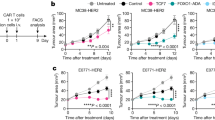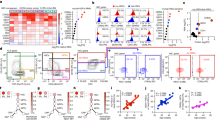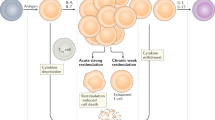Abstract
We have previously reported that an increase in the production of immunosuppressive prostaglandin E2 by a QR tumour (QR-32) is accompanied by progressive growth of the tumour in syngeneic C57BL/6 mice. In order to determine what kinds of cell and factor(s) enable QR-32 cells to promote PGE2 production, we investigated the amounts of PGE2 in the supernatant of QR-32 cells by co-culturing them with various anti-tumour effector cells. Significantly high levels of PGE2 production were observed when the QR-32 cells were co-cultured with lymphokine-activated killer (LAK) cells, natural killer (NK) cells, polymorphonuclear (PMN) leucocytes and streptococcal preparation (OK432)-activated or resident peritoneal macrophages (activated and resident macrophages). On the other hand, PGE2 production was not increased when QR-32 cells were co-cultured with cytotoxic T lymphocytes (CTLs) specific to QR-32 cells. The high levels of PGE2 production were partially or totally inhibited by the presence of radical scavengers such as superoxide dismutase (SOD), catalase and mannitol, although the cytotoxicity of LAK cells was not. We also exposed QR-32 cells to human recombinant cytokines and the growth factors which are produced when anti-tumour effector cells come in contact with tumour cells. Significant PGE2 production by QR-32 cells was observed when the cells were treated with interferon alpha (IFN-alpha), tumour necrosis factor alpha (TNF-alpha) and transforming growth factor beta (TGF-beta) (all P < 0.001). These results suggest that oxygen radicals produced by anti-tumour effector cells and inflammatory cytokines provoke QR-32 cells to produce large amounts of immunosuppressive PGE2.
This is a preview of subscription content, access via your institution
Access options
Subscribe to this journal
Receive 24 print issues and online access
$259.00 per year
only $10.79 per issue
Buy this article
- Purchase on Springer Link
- Instant access to full article PDF
Prices may be subject to local taxes which are calculated during checkout
Similar content being viewed by others
Author information
Authors and Affiliations
Rights and permissions
About this article
Cite this article
Okada, F., Hosokawa, M., Hasegawa, J. et al. Enhancement of in vitro prostaglandin E2 production by mouse fibrosarcoma cells after co-culture with various anti-tumour effector cells. Br J Cancer 70, 233–238 (1994). https://doi.org/10.1038/bjc.1994.285
Issue Date:
DOI: https://doi.org/10.1038/bjc.1994.285
This article is cited by
-
Prevention of inflammation-mediated acquisition of metastatic properties of benign mouse fibrosarcoma cells by administration of an orally available superoxide dismutase
British Journal of Cancer (2006)
-
Conversion of Human Colonic Adenoma Cells to Adenocarcinoma Cells Through Inflammation in Nude Mice
Laboratory Investigation (2000)
-
Inflammatory cell-mediated tumour progression and minisatellite mutation correlate with the decrease of antioxidative enzymes in murine fibrosarcoma cells
British Journal of Cancer (1999)



